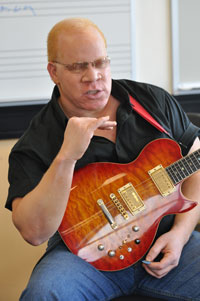"I first got a guitar when I was about maybe seven years old, and for a number of years I tinkered around with it. My mother would always remark that I should hang onto it, because in her mind I picked things up very quickly. I gravitated to what my mom liked because she was a big music fan. We would be driving in the car and a song by Hendrix would come on, or something like that, and she would say, 'Wow—did you hear the way he bent that note? You gotta learn how to do that; that's how guitar playing should sound.'"
"The students who come to me that want to learn funk, I begin by getting them to realize that funk music, just like other styles, is really a language, or a dialect. It's a certain kind of rhythm interpretation. Once students realize they can do a lot to become a better player by just focusing on their rhythm, it just opens doors and they get really excited. That makes it easier for me to teach the deeper harmonic theory, because they've got that rhythmical base."
"I stress accountability, focus, and discipline with my students; I tell them they have to decide what they want to achieve and set standards for themselves that I'm going to challenge them to meet. I say, 'You might not be able to practice six or seven hours a day, but be daily with any goal you want to achieve.' The most radical thing you can do, at least in my opinion, is to make sure you're doing it every day."
"It's really important to be versatile. When you get 'that phone call,' the more prepared you are, the less time you have to waste getting prepared for the gig. Regardless of what style you're learning, it is important to be versatile, because at some point you have to deal with other people in a recording studio who are going to say, 'I don't want you to play that part the way you play it, I want you to play it like it's written on the paper, because this is how the producer wants it.' If you don't do that, then you're not going to get paid, and you probably won't get called back."

